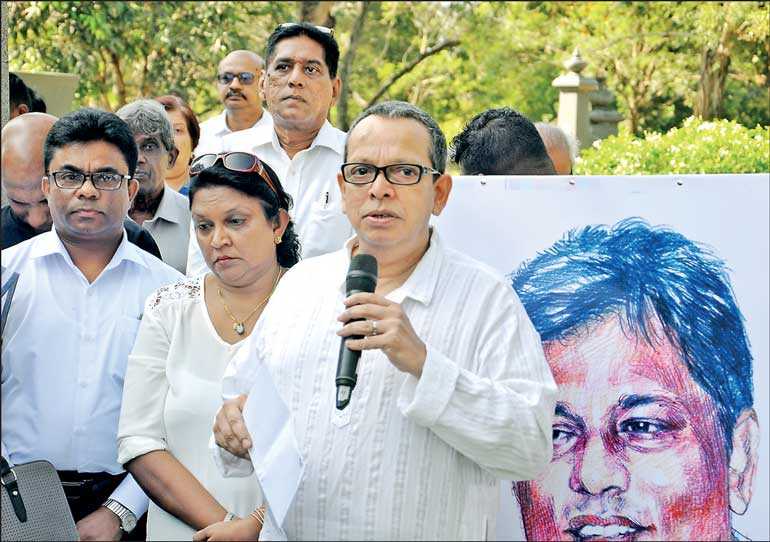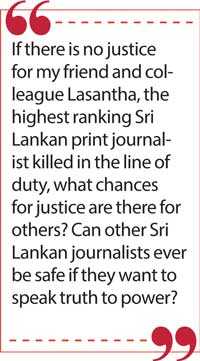Wednesday Feb 18, 2026
Wednesday Feb 18, 2026
Wednesday, 9 January 2019 00:00 - - {{hitsCtrl.values.hits}}

Following is the address by Marwaan Macan-Markar yesterday, 8 January, at the memorial event in Kanatte to mark the 10th anniversary of Lasantha Wickrematunge’s murder
The family and friends of Lasantha Wickrematunge have gathered on the morning of January 8th for the past 10 years to say a prayer and light candles by the side of his grave. It has also been an occasion to share memories, recall his contribution to Sri Lankan journalism, and appeal to the Government that his murderers are brought to book.
The numbers who have shown up at this annual memorial at Kanatte have varied. There have been years when just a handful came; there have been times when we had a larger crowd. It is safe to say that this memorial has now become a barometer of measuring a slice of our country’s political pulse.
The last time I stood here was on the morning of January 8th, 2015. That day was pregnant with added political significance because of the presidential elections. And not surprisingly, we had a large turnout of people from across a wider spectrum of political life. Many who came had thought it fitting to join us in solidarity about remembering our murdered friend and founding editor of The Sunday Leader before going to the polling booths to cast their vote.
Among those at the graveside was Lasantha’s elder brother Lal, The Leader’s publisher, whose prayer that morning was justice for Lasantha. And by the following dawn, it was partially answered by the voters of this island.
Knowing Lasantha, he would probably have relished how even in death he continues to torment the political class of Sri Lanka. Those who worked with him at The Leader may be able to imagine the glint in his eye or devilish burst of laughter at such a prospect, because it is what energised him and infected the newsroom he presided over. What mattered most was to make life difficult for those who abused power through a steady drumbeat of exposes and hard-hitting scoops.
So let us take comfort in the fact that we who meet here to remember our fallen friend are keeping alive that spirit and his creed: journalists have a more pressing role to be a voice of accountability and justice in a country like ours.
But there are many people out there, members of the wider society, even those who knew Lasantha, who ask what we achieve by these annual memorials. Some have even filled the columns of newspapers saying it is time to let Lasantha rest in peace and move on. Some have even pointed to the fact that the small numbers who have gathered at his graveside on some years make little sense to achieve anything more than something symbolic.
I would like to tell those who look at us through such a lens that what we have been collectively involved in since Lasantha was murdered on that Thursday morning on January 8th, 2009, are small acts of resistance. They are aimed at those who want to cover up his murder and protect the ones who have his blood on their hands. They are annual reminders to the death squads that once roamed our streets that they will not be able to get away so easily – in that very Sri Lankan way that anything can be “shaped up” by pulling political strings.
We need to tell those who question our wisdom that such small acts of resistance will continue, and need to be woven into the political fabric of our times till justice for Lasantha prevails. Ours may be a small movement for now, even after these 10 years, but there is still in our step the spirit of an unfinished journey.
It is also our contribution to the politics of memory in a country that remains an open wound. It is our way of refusing to forget, because that is what those who silenced our friend want. It is also our way to offer strength to the families of other journalists who were murdered or disappeared. In doing so, those who have profited from our country’s culture of impunity are being put on notice.
After all, if there is no justice for my friend and colleague Lasantha, the highest ranking Sri Lankan print journalist killed in the line of duty, what chances for justice are there for others? Can other Sri Lankan journalists ever be safe if they want to speak truth to power?
The words of another friend and newspaper colleague, himself a victim of abduction and torture, who fled to Australia for his safety, explain what the country lost with the murder of Lasantha. He was the “media giant of our time,” wrote Keith Noyhar in the Sunday Observer on the eve of this anniversary.
It was the first time Keith had broken his silence after 11 years of torment. He could not have chosen a better moment to pick up his pen. He offered a timely epitaph to a man who made journalism a badge of honour and a beacon of courage.
(Marwaan Macan-Markar is currently based in Bangkok as the Asia Regional Correspondent for the Nikkei Asian Review. He was formerly the Features Editor of The Sunday Leader.)